Turkmens, Turkmenistan, the World: Millenia and 21st Century, Link Between Times and Civilizations
Topic: Turkmenistan Political
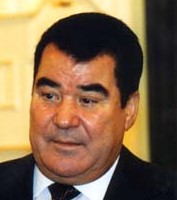 Saparmurat Niyazov's article towards the opening of the United Nations Millennium Summit
Saparmurat Niyazov's article towards the opening of the United Nations Millennium Summit Each nation living on the planet of Earth and individual and collective intellect of the nations are today experiencing the stage of creative strain and searching for development ways and its own place in the global history of the new epoch. No one can be free from this process, as the past gives out no insurance on the future to anyone. It can only serve as a back-up for movement forward, efficiency of which currently depends on an adequate reaction to challenges and changes of time. This is in principle the basic feature of the new century. In this modern world, time flows fast through instants between the eternity of the past and the future. But it is fetching destiny and almighty. If it is used accurately and rationally, it forms a historic memory of a nation and guarantees the future. In his report for the September Millennium Assembly, the UN Secretary-General focuses on a number of problems, which require immediate solution and pertain to various areas of the life of the United Nations: policy, economy, science, culture, health and social infrastructure. As the state with the neutral status, Turkmenistan will continue active and close collaboration with the United Nations on most vital issues of the international agenda.
Turkmenistan has undertaken the first and, therefore, most difficult steps on its way of revival, virtually re-formation of its own sovereign history and state system. It is ancient and event-wise exuberant. But today given the past, we continue it from the scratch. That is why we do not feel the pressure of past resentment, burden of ideologies and phobias, political stamps and national labels. Ideology of independent Turkmenistan is the basis on our religion, Allah the Almighty. It is a belief in ourselves, mankind, its ability to rule the course of history and victory of the instinct to creating and peace. This determines both the conception of our internal development and approaches to basic international problems and tendencies. Among them, today the first place is surely given to globalization. As the determinant of the global development trends at the entrance to the new millennium, it has embraced the entire complicity of the modern world geostrategy, ambiguity of international economic realities and questioned the principles of international law, moral and legal aspects of the relations between countries, groups of countries, whole regions and even continents, which have been so far thought as stable. We are not going to give simple black and white assessments of globalization - generally inevitable objective process predetermined by the course of the global political, economic, scientific and technical development of the second half of the 20th century, which has a significant positive potential. However, one cannot shut one's eyes at its several aspects, which do worry those, who are not fatally confident in a non-alternative for the single political conception due to its so-called superiority over any other and one-standard programmed mankind. We have all the reasons to speak on this with confidence, given our experience from the former Soviet Union, which attempted to retain the imperial model of the state system through imposing stereotypes featuring no national peculiarities and realities. This is a very serious issue, as such an approach casts doubt on the entire system of international relations, legitimacy of established international legal norms, principles and goals, and even the viability of the United Nations as voluntary co-operation of equitable nations.
The political globalization model on the basis of superiority of one, here new liberal conception gradually leads to reinforcing confronting thinking logic at the international level and to weakening those, who does not acknowledge the new international verticality of power on the basis of "humanitarian interventions", protection of "human rights" and not rights of the nations. Like most of the countries of the planet, Turkmenistan is against such an approach. We are positive: the overall progress of the mankind is defined not by dictation of one model, not by unification of life norms and principles but by compatibility of ideas and conceptions.
During the recent visit of the Chairman of the People's Republic of China Xyan Zemin to Turkmenistan and our negotiations on the issues regarding the perspectives of global development, this idea has become the main item of the agenda. And here I find it relevant to fully cite Item 10 of the Joint Turkmen Chinese Declaration.
"The Parties assume that all the countries have the right to identify their political and economic system and social structure, to select a model of ensuring and protecting human rights in compliance with the realities of the country. No country has the right to intervene into the internal affairs of other sovereign states for any reason given including the thesis on the superiority of human rights over sovereignty and the theory on the humanitarian intervention for encroachment on the sovereignty and independence of the countries.
This paragraph is not only a statement of the positions of the two countries, which are quite different in the population scales, economic potential and historic trends. This is a reflection of profound expectations of many nations, which found themselves out of the road of the world history and which associate an inlet to this central road with such concepts as the right to manage their own destiny and national dignity.
The voice of Turkmenistan sounds in full accord with the declarations of the international organizations like Non-Alignment Movement, ECO, Group-77 and other entities, which value the world in its variety. We are stating to affirm that International Law, United Nations Charter and its principles of respect for sovereignty and each country's choice of its own development path and non-intervention into internal affairs shall remain as the basis for peace and order, as the ABC for relations between countries. We share the common view that in the XXI century the United Nations system needs rational reformation. The Assembly could provide a unique opportunity to identify problems, which will emerge in the future, and could launch a creative process of enhancing and strengthening this unique institute. On the threshold of the Millennium Summit, there is on-going active discussion on the need to reform the United Nations, Security Council, to balance the right of veto etc. Turkmenistan adheres to the vision that this endeavour is to be aimed not at damaging and letting emotions dominate but at finding a balanced and elaborate way in addressing the issue of the organization's destiny. We strongly believe if one faces some faults and discrepancies in the functioning of a mechanism, there should be no haste to have it completely replaced. But there should be an attempt to properly diagnose the existing resource. It may turn out that the issue is not the system but those whose role is to represent it at various levels. We are in favour of the UN reform but more towards strengthening and expanding its role in the world, and we are against dissolving the UN into some new multinational structures, having functions delegated to and assumed by certain countries or groups of countries or other organizations. This is to a full extent related to such a serious problem as the Afghan one, which Turkmenistan perceives with a particular attitude due to its historic and geographic reasons. We are convinced and the historic facts of the long-suffering Afghan people obviously prove that: any or even forced intervention from outside into the Intra-Afghan conflict, division of Afghans into bad and good and demonstrative punishment of the former entail only a new cycle of bloodshed and suffering of innocent people. We insist the peace, stability and development in Afghanistan have been deserved through suffering by its people, who are today willing to establish volitional in-country agreement. Good will is also required from those who possess the influence tools outside Afghanistan. The United Nations can be assured that the Special Mission to Afghanistan will find Turkmenistan as a reliable partner, which is ready to actively facilitate the Afghan conflict settlement. Our approach to solving the Afghan matter is based on the common strategy of development of relations with neighboring countries. Turkmens are bearers of ancient civilization values, direct descendants of the Oguz and Seljuks and a nation, which created countries within many hundreds of years on the territories of Central, Southern and Western Asia and the Near and Middle East. This experience, which has formed the character and psychological parameters of the nation, today determines Turkmenistan's choice of the external political strategy and tactical actions based on the tested principle of good neighbourliness, mutually beneficial partnership with Russia, Uzbekistan, Kazakhstan, Azerbaijan, Afghanistan and Iran.
Probably, the best model example is today relations between Turkmenistan and the Islamic Republic of Iran. How myopic were those who within decades of years tried to alienate our nations whose ancient roots come from one source of spirit and culture. The peoples of our countries are united by the common past illumined by names of prominent personalities of the Orient. We prayed and still pray to one God but in the holy sources of Islam each of our nations worship precepts, which have forged in our people special habits and features of behaivour, spiritual and moral principles. Today when history has united us, it has become apparent: it is impossible to artificially unite or separate people and to make them alike as well as to turn them into antipodes. The example of our relations reflects the rule of grand truth: there are no two identical nations as well as no two identical persons. The more we will value relationship and solidarity, the more respect should be given to the differences between us. Only this type of union forms true brotherhood and understanding. Regional co-operation becomes an especially vital issue in terms of ensuring sustainable social development, progress and welfare of the peoples. Currently, our region of Asia is establishing a sustainable system of active interaction powered by the Economic Co-operation Organization, which has partnership relations with the United Nations, ASEAN and other interstate entities. The ECO comprises 10 countries with the population over 300 million people and is a serious resourceful and economic potential. In a short period of its existence, the ECO with its current composition have launched the implementation of the major interregional transport communication projects aiming at bringing together the European and Asian economies, eliminating the technological gap between them and establishing an equitable system of the trade and economic relations between North and South.
Turkmenistan is undertaking efforts to implement this goal through its endeavours to export energetic products to the international markets. Construction of transregional and transcontinental pipelines is a requirement stipulated by time and is a more realistic and most efficient way to overcome the increasing energetic crisis, disproportion in distribution and consumption of resources, which force entire nations to feel fatally doomed, reflect the danger of social explosion in the resource-lacking countries and undermine the principles of security at the national and international levels. Pipelines are new work seats, light and warmth at people's homes. I strongly believe that the formation of Eurasian security along the line South-North, East-West and contours of a would-be group of stable and steadily developing states are linked to future pipeline routes. This means that the constructions of pipelines are not just commercially profitable projects. These are projects of social development on a vast scale, which go far beyond national boundaries and carry powerful psychological and moral charge.
In this regard, Turkmenistan is bringing out its initiative on the guarantees of security and free transit of energetic products via interstate pipelines, which Turkmenistan has preliminarily discussed with a number of heads of states as well as the UN Secretary-General. We support the idea of establishing international legal mechanism on ensuring interests of producers, transit countries and consumers. It is imperative that a possibility of using pipelines as tools of political pressure and economic dictate be completely excluded. The globalization process in the international economic relations requires formulation of an International Convention on the Regime and Guarantees for the Functioning of the Interstate Pipelines. Here Turkmenistan sees one of the most important challenges of the new millennium and performs as the author of this UN document.
There is one more theme, which attracts the interest and attention of the United Nations. Changes in the geopolitical situation have stipulated a new correlation of interests in the Caspian region and a need to develop new approaches to defining the status of the Caspian sea. The current uncertainty on this issue and one-side attempts to impose some variants hampers the littoral countries' rational use of the huge potential of the sea. Most of the Caspian countries support the option of sectoral division of the Caspian Sea. Turkmenistan is in favour of both this principle and the earlier predominant conception of the "common sea". The main importance for us in both cases is to have the interests of the littoral counties taken into account and to build co-operation on the Caspian Sea on the principles of mutual respect, equal rights and mutual benefit. The Caspian Sea has to be the basin of agreement and its resources have to be owned by all the littoral countries, each of which has the right to an appropriate national part of the basin. Turkmenistan believes that the search for a new legal status of the Caspian Sea, which requires all the littoral countries to identify a rational compromise and display their readiness to adequately accept a new reality, shall be provided with United Nations monitoring. Today, the process of formulating a new international legal status of the Caspian Sea faces certain complications that present a negative potential for the regional stability. Under the circumstances, active involvement of the United Nations appears to be even more appropriate.
One of the key tasks of the modern world is to establish equitable, partnership-based and fair relations between the states, which experience different levels of social, economic, technological and industrial development. It is not a fault of the peoples that the burden of problems accumulated within decades and even hundreds of years has today fallen on them, thus causing disappointment, pessimism and sometimes inadequate perception of own destiny by whole nations and continents. There has never been such an immense gap in consumption levels and distribution of resources between poor and rich countries. And there has never been an obvious threat, as a result of this, to undermine the entire system of global stability and security. Sources of most of periodically emerging military conflicts in various places of the planet and ethnic wars are of social and economic nature. Taking them as the global collision of cultures, religions and civilizations and using the logic of crusades in the modern world mean only replacement of conceptions. The root of evil does not come from the fatal incompatibility of views and values of the West and East or inter-religious contradictions. But it originates from the fact that the so far existing system of international economic relations as it is now does not comply with more political realities and needs of the world's 'population. We support the efforts of the United Nations Secretary-General, UNDP and other agencies in creating a principally new non-discriminatory model of relations between big and small, industrial and agrarian countries and in adjusting broad interregional co-operation. And, of course, it should not be stipulated with political concessions and infringement of sovereignty.
The club of the selected, if still relied upon by someone for its omnipotence, should understand that an entry ticket to it cannot be paid with the size of own dignity. And this is also one of the features of the XXI century.
Defending respectfulness, tolerance and humanity in international relations, Turkmenistan advocates these principles in its internal life. Introducing the ideals of inter-ethnic and inter-religious agreement, tolerance, social partnership and justice in the country and society is the priority for our internal policy. Right after obtaining independence, Turkmenistan pronounced that the supreme value of the state is the human being, his life, health, security and his proper moral and physical development. The country has announced and started the implementation its course towards the implicit priority of social protection of the population and guarantee from poverty and destitution. This has enabled to ensure general political stability and trust in the on-going reforms. Measures undertaken in Turkmenistan in the years of independence have resulted into significant decline of infant mortality, increase in life expectancy and crime reduction. The state has established strong guarantees for protecting motherhood and childhood and the rights of the youth, women and elder people.
This area reflects an increasing importance of collaboration with specialised agencies such as the World Health Organisation (WHO), United Nations Population Fund, UNAIDS, UNICEF, USAID, International Health Care Association (USA), International organisation "Doctors without Borders". With the assistance of the WHO, UNDP and TICA a project on providing support to the implementation of the State Health Programme has been formulated and is currently being implemented on a stage-by-stage basis.
Further development of the socially oriented policy of Turkmenistan has found its reflection in the formulated Strategy of Social and Economic Reformations in Turkmenistan for the period up to 2010. It envisages continuation to prioritize social programs, given the economic reality formed in the years of independence. To date, Turkmenistan joined the group of countries, which have sufficient self-supply in production of grain crops and basic food items by having implemented the principal elements of its complex program on economic security. We are glad to note that the activities and achievements of the Turkmen people are highly evaluated by the United Nations. Our plans and programs always fully comply with the general strategy of this major international organization.
The economic program foresees expedited development of the real sector of the economy, institutional reformations and attracting investment including foreign funds. Sectors of agriculture, fuel and energetic, chemical and consumption complexes, transport and communication infrastructure and networks of transnational pipelines exporting Turkmen energy products to world markets will be given priority in terms of development. The country will form new sectors: black and nonferrous metals manufacture, pulp and paper industry, spirit production etc. To achieve these objectives, Turkmenistan possesses sufficient volumes of mineral raw, land and labor resources and trained specialists and personnel. By the end of 2010, the labor resources will have increased 1.7 times and will constitute 4.5 million people. The planned pace of economic development and foreseen measures for the period forecast are expected to create more than 1.5 million new work seats, thus ensuring full employment of the population. Furthermore, in 2010 the percentage of the unemployed will not exceed 2% of total labor resources.
The strategy of reformation in Turkmenistan for this period seeks to ensure that the average annual rate of economic growth will not be less than 18%, given the maximum use of all the sectors of economy. One of the main strategic objectives for the period forecast continues to be developing productivity potential. Like before, the leading role is assumed to the fuel and energetic sector. It is expected to focus efforts on laborious sectors, which are considered perspective in terms of their potential and competency. These are agriculture, light and food industries, tourism and construction of residential houses and infrastructure.
The key task of all the agricultural reforms scheduled for this period is still increasing production of strategically important products - cotton and grain. In 2005 it is estimated to collect 2.5 million tons of raw cotton and 2.2 million tons of grain. Already this year, the Turkmen grain crops have reached 1.75 million tons. For comparison: in its first year of independence Turkmenistan grew 70,000 tons of grain. These are the dynamics of our independence, our contribution to solution of the global task to supply the population of the planet with food, products critical for people's lives.
The strategy of national economy development envisages considerable enlargement of the existing potential. This, in turn, predetermines attraction of major investment resources. The total investment volume at the expense of all funding sources should increase 2.7 times by 2010 in comparison with 2000.
The economic growth cannot by itself guarantee welfare of our citizens. It can only create enabling conditions and prerequisites for this. Therefore, major focus is streamed onto insistent and planned work on addressing social matters.
The strategic goal of Turkmenistan's social policy for the period up to 2010 continues to be ensuring high indicators of people's living standards. As it was earlier, significant budget funds will be allocated to the social sector and its development. Given the population growth, it is foreseen to construct new social facilities and to efficiently use the existing infrastructure. Protection will be provided to vulnerable groups of people along with free-of-cost provision of gas, water, electricity and salt.
The reforms will provide further development of the non-public sector of the economy. In this sector, the number of enterprises will significantly increase. These reformations are stipulated by development of private and mixed forms of property, acceleration of the privatization process and improvement of organizational legal forms of household structures (farmer associations and consumer's co-operation). The program is expected to have around 3,000 state enterprises and structures privatized by the end of the period forecast.
Our goal is to turn Turkmenistan into a prosperous country and make it reliable home for every man. All the state programs of independent Turkmenistan are based on the objective to constantly increase the people's welfare and achieve sustainability of their rights.
In December 1999, the Supreme Legislative institution of the country People's Council adopted the resolution and ratified the Law on full and irrevocable repeal of the death punishment in Turkmenistan, which had become the first document of humanities power to be ever adopted on the Asian continent. To continue humanistic acts in the societal life, Turkmenistan has adopted the Law on the annual amnesty announced on the eve of the Forgiveness Night - Gadyr Gije. This act provides people with an opportunity to return on a righteous path, live and work honestly.
Turkmenistan has joined the Second Optional Protocol of the International Convention on Civil and Political Rights, thus confirming our intentions to practically and principally implement the principles of humanism, democracy and protection of freedoms and human rights. We are particularly proud that Turkmenistan has been one of the first independent countries to take these steps. Nonetheless, on these issues we as realists and pragmatists understand that social development is a constant process, which needs cooperation, exchange of ideas and, first of all, dialogue with the United Nations.
The link and interdependency of the processes currently taking place in the world are obvious. Their dialectics are built based on the line: citizen - state - region - continent - whole world - mankind. And therefore, we believe that understanding the full dimensions of its responsibility, any state or any nation, big or small, is today able to influence the course of global development by following this consequence. Adherence to this approach constitutes the direction of Turkmenistan's positions and actions on most important and vital problems of global development aiming at matching global objectives with our national interests. To handle these, the international community of nations has to take only joint efforts by applying modern political technology. There has to be no chance for economic or political blackmail or dictate, and no assistance from international organizations, individual countries or financial institutions should be stipulated by infringement of the sovereign rights of the states. The right of power has to give in to the power of the right. This is another feature of the new epoch. Turkmenistan has always insisted and insists on this approach, which complies with moral criteria of the Turkmen people and its political conception that has become a starting point in attaining state neutrality.
This year Turkmenistan will be celebrating the symbolic day in its history of independence - the 5th anniversary of the neutrality status given by the United Nations. These years have displayed that Turkmenistan is an active participant in the regional and international projects and an independent in selecting external political priorities, what is highly evaluated by the United Nations. Sincerely thankful to the international community for support, Turkmenistan will continue to practically prove that neutrality, love for peace and good neighborhood will be preserved at the heart of the external policy of Turkmenistan, which cannot imagine its destiny detached from the common destiny of the mankind.
On 27 December 1999, the People's Council of Turkmenistan adopted the Declaration on the External Policy of Turkmenistan in the XXI century based on the neutrality status and the principles of love for peace, good neighborhood and democracy. This historic document of ours states on the steadiness of the external policy of neutral Turkmenistan as the state practically and principally implementing the principles of humanism, democracy and protection human rights and freedoms.
Turkmenistan acknowledges and respects human rights and freedoms accepted by the international community and reflected in the norms of international law. The Declaration once again emphasized the priority of the long-term perspective of co-operation between Turkmenistan and the United Nations in this area. The active participation of Turkmenistan in the process of multilateral co-operation on human rights with international organizations and, first of all, with the United Nations is confirmed by our country's membership in more than 40 international organizations. Moreover, more than half of them deal with ensuring and protecting human rights and freedoms.
Currently, there are more than 70 international documents on human rights adopted under the auspices of the United Nations. Turkmenistan has joined more than 30 international agreements on human rights. Among these are the 1949 Geneva Conventions on protecting victims of international military conflicts and 1977 Supplementary Protocol to them, 1966 Conventions on Civil and Political Rights and on Economic, Social and Cultural Rights, World Declaration on ensuring lives, protection and development of children, Convention on Children's Rights, International Convention on Elimination of All Forms of Racial Discrimination, Convention on the Refugee Status and so on. All of this provides clear evidence that human dimension is the main criterion for the nature of internal reforms in the Turkmen community and its external policy and that only the priority of common human values and supreme ideals of humanism and justice form the basis for neutral Turkmenistan's policy. 12 December of this year is the 5th anniversary of Turkmenistan's neutrality granted through the United Nations General Assembly's resolution. This date will give a new start for our external policy towards the new century.
National mentality of the Turkmen is in general humane in its deep essence. Within many centuries, Turkmenistan has been the crossroad for the East and West, South and North and played a major role of the central section on the Grand Silk Road from China to Europe, which had been the road of peace and cultural dialogue between various nations for almost 1,500 years. This all has been instrumental in creating special spiritual atmosphere on the Turkmen land and intellectual potential, which contained the engine power for the cultural progress specific to all the civilizations of ancient Turkmenistan. These are the sources for Turkmen people-specific frankness, love for peace and respect for cultures and religions of other nations. Neutrality is a natural and logic development of the entire spiritual life of the nation and young country's foreign policy, which has united the understanding of its role at the international political level and historic traditions of relations between the Turkmens and the rest of the world. All of us are contemporaries in the XXI century. The complicity of objectives faced by the countries-members of the United Nations is apparent. The dimensions of challenges of the organization is adequate to the hopes, which people have all over the world expecting that the change of epochs will lead to real improvements of their lives. It concerns big and small, rich and poor, new and long existing countries. We encounter problems, solution of which requires joint efforts and needed awareness of individual responsibility. This is the logic of Turkmenistan's political behaivour that has been deserved through suffering by my nation in the past and the present and that has determined the way of its development for the new century and millennium. Turkmenistan will of course respond to the UN Secretary-General's appeal towards the peoples of the world for uniting efforts to make the XXI century more secure and fairer than the XX one. These coming hundred years will be the golden century in the history of the Turkmen people.
Saparmurat Niyazov
President of Turkmenistan
October 25, 2000
Posted by countryturkmenistan
at 11:01 PM
Updated: Monday, 11 July 2005 10:15 AM
 Over US $ 1 billion have been invested in the republic?s textile industry since independence.
Over US $ 1 billion have been invested in the republic?s textile industry since independence.
 Saparmurat Niyazov's article towards the opening of the United Nations Millennium Summit
Saparmurat Niyazov's article towards the opening of the United Nations Millennium Summit 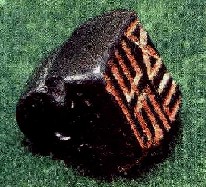 In an unexpected benefit of the Cold War's end, Russian and American archaeologists say they have discovered an ancient civilization that thrived in Central Asia more than 4,000 years ago, before being lost in the sweep of history.
In an unexpected benefit of the Cold War's end, Russian and American archaeologists say they have discovered an ancient civilization that thrived in Central Asia more than 4,000 years ago, before being lost in the sweep of history. 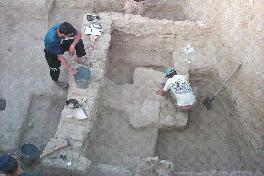 Mr. Mair said that discovery of ruins of an advanced culture in a region "where there was thought to be just space and emptiness fills an enormous gap" in terms of trade and cultural exchange across Asia in antiquity.
Mr. Mair said that discovery of ruins of an advanced culture in a region "where there was thought to be just space and emptiness fills an enormous gap" in terms of trade and cultural exchange across Asia in antiquity. 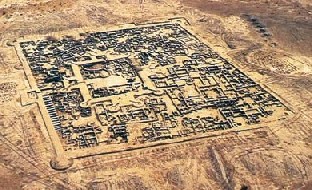 A new book by well-known Russian archaeologist Victor Sarianidi about excavations in the ancient country of Margush is published in Turkmenistan
A new book by well-known Russian archaeologist Victor Sarianidi about excavations in the ancient country of Margush is published in Turkmenistan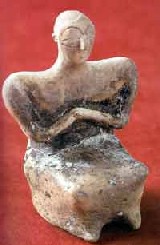 We were lucky to open the tsar’s funeral complex where you can find not only the defunct but also symbols of statehood as well: stone scepters that were used as an attribute of power in ancient times; pictures of eagles in the golden cover, golden and silver vessels, traces of rich sacrifices, mosaic on walls and hearses that still has no analogy in Central Asia. Moreover, several true masterpieces of the ancient jewellery art feature among the masses of findings. First of all, it is a small sculpture of djeiran made of gold and a sculpture of a lion cub turned in turquoise. Their size is less than a centimeter but you can see all the details of the amazing works of ancient masters of Turkmenistan through magnifying lens. The works merit being included into the Guinness Book of Records. I hope that these masterpieces will be soon displayed in the new Museum of Fine Arts in Ashgabat for they represent the earliest pieces of the art of ancestors of the Turkmen people.
We were lucky to open the tsar’s funeral complex where you can find not only the defunct but also symbols of statehood as well: stone scepters that were used as an attribute of power in ancient times; pictures of eagles in the golden cover, golden and silver vessels, traces of rich sacrifices, mosaic on walls and hearses that still has no analogy in Central Asia. Moreover, several true masterpieces of the ancient jewellery art feature among the masses of findings. First of all, it is a small sculpture of djeiran made of gold and a sculpture of a lion cub turned in turquoise. Their size is less than a centimeter but you can see all the details of the amazing works of ancient masters of Turkmenistan through magnifying lens. The works merit being included into the Guinness Book of Records. I hope that these masterpieces will be soon displayed in the new Museum of Fine Arts in Ashgabat for they represent the earliest pieces of the art of ancestors of the Turkmen people.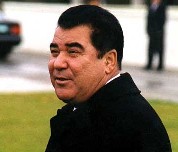 Saparmurat Niyazov was born on February 19, 1940, into a worker's family in Ashgabat. His father died in battle in World War II and the remaining members of his family perished in Ashgabat's massive earthquake of 1948. He was raised first in an orphanage and later in the home of his distant relatives.
Saparmurat Niyazov was born on February 19, 1940, into a worker's family in Ashgabat. His father died in battle in World War II and the remaining members of his family perished in Ashgabat's massive earthquake of 1948. He was raised first in an orphanage and later in the home of his distant relatives.